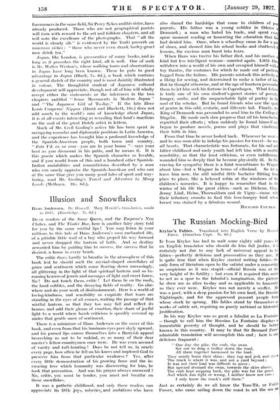Illusion and Snowflakes
Hans Andersen. By Himself. Mary Howitt's translation, made in 1847. (Routledge. 7s. 6d.)
DEAR readers of the Snow Queen, and the Emperor's New Clothes. and The Tinder Box, here is another fairy story told for you by the same wistful lips ! You may listen in your millions to this talc of Hans Andersen's own enchanted life, of a pitiable little waif of a boy who groped his way forward and never dropped the lantern of faith. And so destiny rewarded him by guiding him to success, the success that he desired, a home in every heart.
Time critic dares hardly to breathe in the atmosphere of this book lest he should melt the myriad-shaped snowflakes of grace and sentiment which come floating down unceasingly, all glittering in the light of that spiritual lantern and so be- coming bearers of jewels and messages of light and sweet fancy. No ! Do not touch them, critic ! Let them lie on the roofs, the hard cobbles, and the decaying fields of reality. Go else- where and do your work of disillusionment. Mere is a world of loving-kindness, and sensibility so exquisite that tears are standing in the eyes of all comers, waiting the passage of that wistful lantern, so that they too may fall and reflect its beams, and add their gleam of emotion, their share of joyful light to a world where harsh criticism is speedily covered up under that gentle snow of sentiment.
There is a miniature of Hans Andersen on the cover of this book, and even from that his luminous eyes peer shyly upward, and his pursed lips enrose themselveS into a Barryish appeal beseeching us not to be unkind, as so many of their dear master's fellow-countrymen once were. He was even accused of vanity and tuft-hunting Does he not tell us, in nearly every page, how often he fell on his knees and implored God to preserve him from that particular weakness ? Yes, after every little demonstration of his growing fame and the in- creasing love which humanity was discovering for him, he took that precaution. And was his .prayer always answered ? No, critic, you must be tender, you must not breathe on those snowflakes.
It was a pathetic childhood, and only those readers can appreciate its little joys, miseries, and ambitions who have. also shared the hardships that come to children of parents. His father was a young cobbler in Odense Denmark ; a man who hated his trade, and spent every spare moment reading or lamenting the (duration that fah had denied him. Once, when a schoolboy came in for a pai of shoes, and showed him his school books and chattered lessons, the envious man burst into tears.
When Hans was twelve his father died, and his mothers kind but less intelligent woman—married again. Little Ilan, withdrew into a world of his own and occupied himself with* toy theatre, the costumes for which he made out of patters begged from the tailors. His parents mistook this activity al a liking for sewing, and determined to make a tailor of Mal, But he thought otherwise, and at the age of fourteen persuade( them to let him seek his fortune in Copenhagen. What follow' is truly one of his own student's-garret stories of poverty, hunger, snubs, and the unquenchable light of poetry in the soul of the scholar. But he found friends who saw the spark of genius in this odd, ecstatic, and illiterate lad. Finally, the King of Denmark was persuaded to send him to the College of Slagelse. He made such slow progress that all his benefactor regretted their efforts ; when suddenly he found himself and began to produce novels, poems and plays that vindicated their faith in him From that time he never looked back. Wherever he went- and he was soon able to indulge his passion for travel—he von all hearts. That characteristic was fortunate, for his sad and bitter childhood and early youth had left him with a morbid sensibility, so that the least criticism, or even indifference, wounded him so deeply that he became physically ill. In thh craving for sympathy there is a faint resemblance to Wagner about him--but a Wagner in terms of elfinland. So let a leave him now, the still wistful little bachelor flitting from place to place, like a beloved robin at the windows of the children's nurseries. It is happy to remember that in tit winter of his life the great elders—such as Dickens, lingo, Jenny Lind, Heine, Thorwaldsen and de Vigny—came with their tributary crumbs to feed this love-hungry bird whose breast was stained by a fabulous wound.
RICHARD CHURCIL






































 Previous page
Previous page